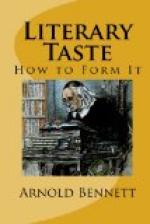It is not merely useless, it is harmful, for you to map out literature into divisions and branches, with different laws, rules, or canons. The first thing is to obtain some possession of literature. When you have actually felt some of the emotion which great writers have striven to impart to you, and when your emotions become so numerous and puzzling that you feel the need of arranging them and calling them by names, then—and not before—you can begin to study what has been attempted in the way of classifying and ticketing literature. Manuals and treatises are excellent things in their kind, but they are simply dead weight at the start. You can only acquire really useful general ideas by first acquiring particular ideas, and putting those particular ideas together. You cannot make bricks without straw. Do not worry about literature in the abstract, about theories as to literature. Get at it. Get hold of literature in the concrete as a dog gets hold of a bone. If you ask me where you ought to begin, I shall gaze at you as I might gaze at the faithful animal if he inquired which end of the bone he ought to attack. It doesn’t matter in the slightest degree where you begin. Begin wherever the fancy takes you to begin. Literature is a whole.
There is only one restriction for you. You must begin with an acknowledged classic; you must eschew modern works. The reason for this does not imply any depreciation of the present age at the expense of past ages. Indeed, it is important, if you wish ultimately to have a wide, catholic taste, to guard against the too common assumption that nothing modern will stand comparison with the classics. In every age there have been people to sigh: “Ah, yes. Fifty years ago we had a few great writers. But they are all dead, and no young ones are arising to take their place.” This attitude of mind is deplorable, if not silly, and is a certain proof of narrow taste. It is a surety that in 1959 gloomy and egregious persons will be saying: “Ah, yes. At the beginning of the century there were great poets like Swinburne, Meredith, Francis Thompson, and Yeats. Great novelists like Hardy and Conrad. Great historians like Stubbs and Maitland, etc., etc. But they are all dead now, and whom have we to take their place?” It is not until an age has receded into history, and all its mediocrity has dropped away from it, that we can see it as it is—as a group of men of genius. We forget the immense amount of twaddle that the great epochs produced. The total amount of fine literature created in a given period of time differs from epoch to epoch, but it does not differ much. And we may be perfectly sure that our own age will make a favourable impression upon that excellent judge, posterity. Therefore, beware of disparaging the present in your own mind. While temporarily ignoring it, dwell upon the idea that its chaff contains about as much wheat as any similar quantity of chaff has contained wheat.




